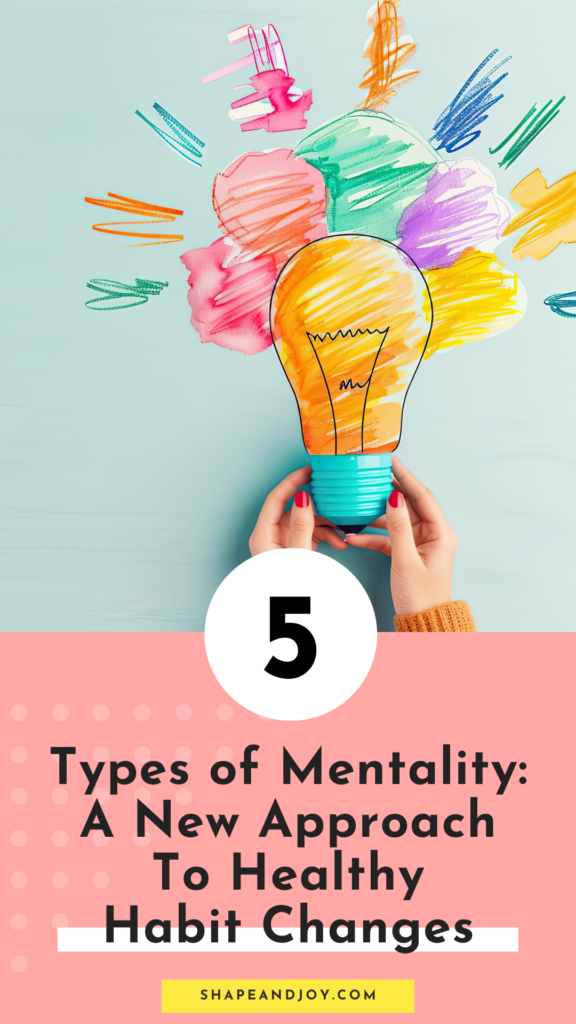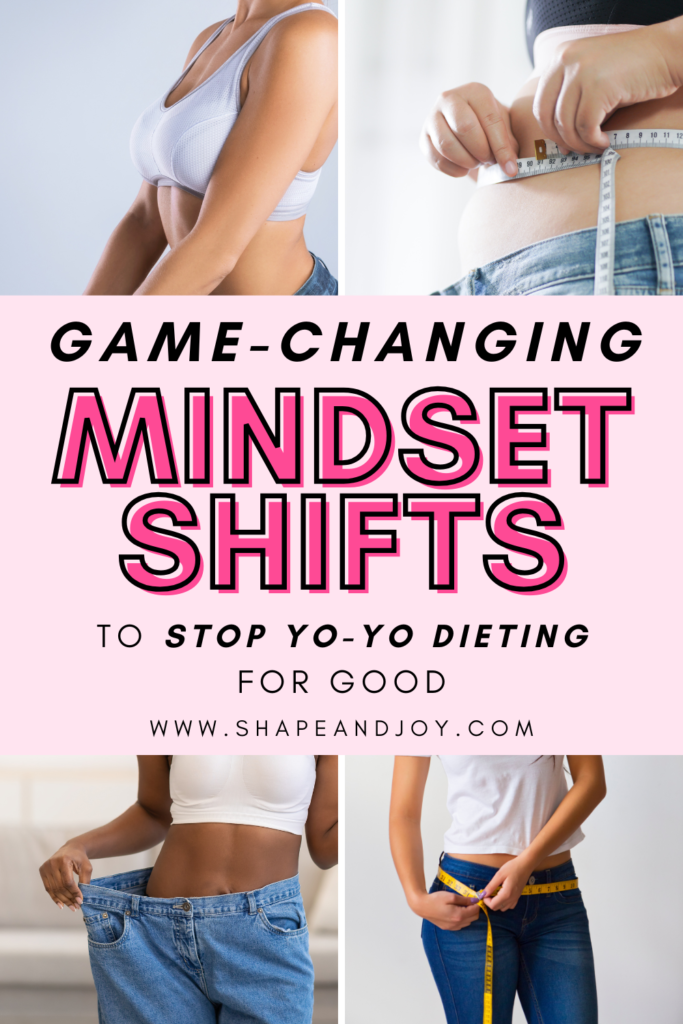This post may contain affiliate links, which means that I may earn a commission if you click on the link, with no cost for you. It’s one of the ways I support my blog. You can read more about this here.

Right then, let’s talk mentality. It’s the make-or-break factor in your health journey, the thing that determines whether you power through setbacks or crumble at the first hurdle. And here’s the kicker—your mentality isn’t set in stone. It’s not a personality trait you’re stuck with. The types of mentality you adopt can either fuel your success or sabotage it entirely.
Want to know which ones are holding you back? More importantly, want to know how to fix them?
Let’s dive into the five biggest mentality types that can shape your fitness and weight loss journey for better or worse.
- 1. Fixed Mindset vs. Growth Mindset – The Mentality That Makes or Breaks You
- 2. All-or-Nothing Mentality – The Perfectionist Trap
- 3. Process-Oriented vs. Outcome-Oriented Mentality – Are You Enjoying the Journey?
- 4. Victim Mentality – The “It’s Not My Fault” Mindset
- 5. Flexible vs. Rigid Mentality – Adaptability is Key
- Types of Mentality: Final Thoughts
1. Fixed Mindset vs. Growth Mindset – The Mentality That Makes or Breaks You
Fixed Mindset: Stuck in the Same Old Patterns
If you’ve ever thought, “I’ll never be fit” or “I’m just not the type of person who can lose weight,” then congratulations, you’re dealing with a fixed mindset.
This mentality tells you that your abilities are set in stone. If you struggle with weight loss, you assume that’s just who you are, rather than something you can change.
Why this mentality holds you back:
- You give up at the first sign of difficulty.
- You see failure as proof that you are not good enough.
- You avoid challenges because you are scared of looking bad.
Growth Mindset: The Mentality for Winners
A growth mindset tells you that skills, habits, and success are built over time, not something you are just born with. Instead of seeing failure as proof you should quit, you see it as a lesson.
How to shift into a growth mindset:
- Accept that progress takes time.
- Treat setbacks as learning opportunities, not proof that you have failed.
- Focus on what you can do, instead of what you cannot do yet.
Next time you hear that little voice in your head saying, “I can’t do this,” add one tiny word: “I can’t do this yet.”

2. All-or-Nothing Mentality – The Perfectionist Trap
If you have ever thought, “Well, I already ate a biscuit, so I might as well eat the whole packet and start again Monday,” then congratulations—you have fallen into the all-or-nothing mentality.
This mentality makes you believe that if you cannot be perfect, then it is not worth trying at all. Spoiler alert: perfection does not exist.
Why this mentality will wreck your progress:
- You either follow your diet perfectly or go completely off the rails.
- You are either smashing workouts every day or doing nothing at all.
- One “bad” meal means your entire diet is ruined.
How to ditch all-or-nothing thinking:
- Health is not about being perfect, it is about being consistent.
- Messed up one meal? No big deal. Just get back on track at your next meal.
- Progress, not perfection, is what matters.
3. Process-Oriented vs. Outcome-Oriented Mentality – Are You Enjoying the Journey?
Outcome-Oriented Mentality: Obsessed with the Finish Line
If your only focus is hitting a goal weight, you are probably making the journey miserable for yourself.
You ignore all the good things happening along the way—more energy, better sleep, feeling stronger—because you are fixated on the number on the scale.
Why this mentality will keep you stuck:
- You feel like a failure if results do not happen fast enough.
- You rush through the process, desperate for results.
- You lose motivation as soon as progress slows down.
Process-Oriented Mentality: Learning to Love the Journey
People who actually keep the weight off have one thing in common: they enjoy the process of getting healthier.
How to shift into a process-oriented mentality:
- Focus on small daily wins like eating more vegetables, lifting heavier, or running further.
- Set process-based goals like “I’ll work out three times a week” instead of “I’ll lose 5kg.”
- Stop living for some future moment and start enjoying right now.
📌 Pin this for later! ⬇

4. Victim Mentality – The “It’s Not My Fault” Mindset
Ever catch yourself thinking, “I just have bad genetics” or “I don’t have time to be healthy”? That is the victim mentality talking.
Why this mentality holds you back:
- You blame external factors instead of taking responsibility.
- You believe that nothing is in your control.
- You focus on excuses instead of solutions.
How to ditch the victim mentality:
- Take ownership—yes, life throws obstacles at you, but you get to choose how you respond.
- Focus on what you can control instead of what you cannot.
- Stop waiting for perfect conditions—start where you are, with what you have.
Related Post: How to Stop Yo-Yo Dieting for Good
5. Flexible vs. Rigid Mentality – Adaptability is Key
Rigid Mentality: The “My Way or No Way” Approach
You have a plan, and you refuse to change it, no matter what. You eat the same meals, do the same workouts, and if life throws a curveball? You panic.
Why this is a problem:
- Life is unpredictable. If you cannot adapt, you will quit as soon as something disrupts your routine.

Flexible Mentality: The Key to Long-Term Success
People with a flexible mindset roll with the punches. They adjust their approach when needed instead of throwing in the towel.
How to develop a flexible mentality:
- Can’t get to the gym? Do a home workout.
- Travelling? Find meals that fit your goals instead of stressing about a perfect diet.
- Had a rough week? Instead of quitting, adjust your plan and keep going.
Mindset Hacks for Weight Loss Success: Must-Read Posts
Struggling with motivation? Stuck in self-doubt? These posts will rewire your mindset, boost confidence, and keep you on track!
- Lost Your Mojo? 3 Motivation Killers Sabotaging Your Weight Loss
- Are You Stuck in All-or-Nothing Thinking? Here’s Why It’s Sabotaging Your Weight Loss
- Why Your Weight Loss Motivation Keeps Running Out—And How to Fix It
- How Positive Affirmations Can Transform Your Weight Loss Journey
- Mindset Matters: Change How You Think To Lose Weight
- 5 Types of Mentality: A New Approach To Healthy Habit Changes
- Achieve Breakthrough Results with the Be, Do, Have Mindset
- When Goals Backfire: Consequences of Unrealistic Expectations
- Growth Mindset: Why It’s Essential for Self-Motivation and Personal Improvement
- 30 Inspiring Quotes For Your 2025 Fitness Vision Board
- The Ultimate Mindset Shift Toolkit: 15 Products to Rewire Your Brain for Success
Types of Mentality: Final Thoughts
Your mentality matters. The way you think shapes the way you act, and that determines your results.
- Fixed vs. Growth Mindset: Stop thinking you cannot change. You can.
- All-or-Nothing Mentality: Progress beats perfection every time.
- Process vs. Outcome: Enjoy the journey. That is where the real transformation happens.
- Victim Mentality: Take ownership. You have more control than you think.
- Flexible vs. Rigid: Adaptability is the key to long-term success.
Now, which of these types of mentality have been holding you back? And more importantly, which one are you going to change first? Let me know in the comments.
📌 Pin this for later! ⬇


